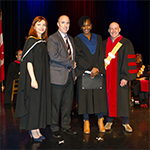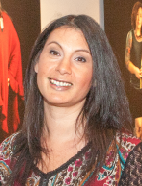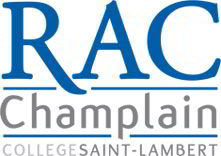On May 23rd, 2018, Champlain, in collaboration with L’Association des éducatrices et éducateurs spécialisés du Québec (AEESQ) and the Quebec Association of Educators (QAE), will be a hosting a one-day Special Care Counselling conference titled “Healing Ourselves, Healing Others.” It will start at 8:30am, and end at 3:45pm, with lunch included with registration. The conference will feature a number of a workshops, as well as a keynote address by Nakuset.
“The primary focus of helping professionals is to help and “Heal Others” by providing support, guidance, tools and care. There is also an unspoken, very real need for self-care amongst professionals making it equally important to help and “Heal Ourselves”. This conference provides the opportunity for participants to address both.
Learn innovative tools and strategies to extend and hone your ability to work with clients who have diverse and complex needs. Participants will have the chance to reflect on best practices, as well as connect and share with other professionals.”
The Power to Heal – One Woman’s Journey
 Listen to Nakuset’s powerful and moving story of loss of identity and personal struggles; her determination and resilience to not only overcome her losses but to be a positive influence and leader in her community. Nakuset makes a difference in the lives of many. Her story will inform, educate and inspire you to listen more carefully, intervene thoughtfully, and always consider the purpose of your intervention when it comes to working with Urban Aboriginal people.
Listen to Nakuset’s powerful and moving story of loss of identity and personal struggles; her determination and resilience to not only overcome her losses but to be a positive influence and leader in her community. Nakuset makes a difference in the lives of many. Her story will inform, educate and inspire you to listen more carefully, intervene thoughtfully, and always consider the purpose of your intervention when it comes to working with Urban Aboriginal people.
Registration will be free for all active Special Care Counselling Continuing Education students, as well as active RAC candidates in Special Care Counselling – please contact Laura Malbogat for more information.
The following workshop options will be available:
10:30am – 12:30pm
Session 1: Mindfulness
Presented by Carl Lemieux, Psychologist, Partner & Managing Director of Mindspace Clinic
Our brain has evolved over the years to ensure our survival but we are only now beginning to understand how to unleash our full potential. This workshop is an introduction to mindfulness as a proven practice to reduce stress, enhance wellbeing and live with a greater sense of purpose. The speaker will present the latest neuroscience supporting mindfulness, facilitate mindfulness exercises during the workshop and engage in a dialogue to help participants demystify this emerging practice
Session 2: Indigenous Awareness & Deeper Understanding
Presented by: Nakuset, Executive Director of Native Women’s Shelter of Montreal
This workshop will focus on sharing important historical context of Indigenous people including highlights from Nakuset’s personal journey. Participants will gain knowledge about existing projects that help, support and strengthen Urban Aboriginals. The workshop leader will also share ways to implement systemic change within institutions.
Session 3: Inclusion Strategies for Children on the Autism Spectrum
Presented by: Marla Cable, Giant Steps Resource Training Centre Coordinator
Inclusion of children on the autism spectrum in mainstream classrooms presents some key challenges. This workshop will explore concrete, hands-on skills and strategies on how to provide effective support and guidance so students on the autism spectrum can be active participants in the class. In order to maximize the benefits of this workshop, participants must have a general understanding and knowledge about autism. This workshop will be interactive as well as providing participants an opportunity to work in teams. Case studies will be provided and strategies on how to best support students with autism in the class will explored and developed.
Session 4: Vicarious Traumatisation: What It Is And What You Can Do About It
Presented by: Dr. Kees Maas, Private Practice Psychologist
Vicarious traumatisation refers to a transformation in the trauma worker’s inner experience resulting from empathic engagement with the trauma material of a client. In order to avoid vicarious traumatisation or professional burnout, a mix of personal and organizational strategies is required. During this workshop, participants will be able to identify personal limits, and acknowledge the personal distress that work can bring. Participants will explore the best work-rest-play balance needed to take care of oneself.
Session 5: Reflections on Receiving Services or Being In Care
Presented by: Moderator Mélanie Fournier, Educator – CIUSSS – West-Island
Listen to the voices of adults who once received services in foster care, group homes, residential care, etc. They will present their personal journeys about the service system in which they were involved, its impact on their lives, and how they would change it if they could. They will reflect on best practices that worked during the time they were in care and those that did not. The session format includes panel participants sharing their personal journeys followed by Q&A.
1:30pm – 3:30pm
Session 6: Three Powerful Healing Practices
Presented by: Sherril Gilbert, Champlain College, Content Specialist
The helping profession can be extraordinarily rewarding, and yet it is also one that can be emotionally and physically draining. To be fully present for others requires that we make time for self-care and personal restoration. This lively personal and professional growth workshop experience is for helpers who need to build and strengthen self-care resources, and will introduce participants to three healing practices for helpers: HELP (letting go), THANKS (gratitude), and WOW (radical amazement).
Session 7: Boundaries, Ethics and Indigenous Communities
Presented by: Loanna Zacharie & Louis Jacco, Support Counsellor & Clinical Supervisor – Kahnawake Shakotiiatakenhas Community Services (KSCS)
This workshop will explore the theoretical concepts of boundaries and ethics and how they do not comply with the realities of an indigenous community. Two Kahnawake residents, working the front lines in their own community share their experience of dual roles, conflicts of interests, the challenge in self care practices at home, and the obstacles inherent with the lack of anonymity. Exploration of improved manners of practice between outside agencies and Indigenous organizations will be explored.
Session 8: ASD: Looking at Behaviours Through the A-B-C Model
Presented by: Loretta Labrecque, New Frontiers School Board – Autism Specialist
In this workshop, participants will become detectives in examining and understanding students’ behaviors and explore strategies to apply when intervening with their students. Participants will also examine how their behavior can influence situations. Although the focus of this workshop will be on students within the Autism Spectrum, the A (antecedents) B (behaviors) and C (consequences) model can be applied to all students.
Session 9: DeStress 4 Success
Presented by: Robert Calame & Sophie Massé, REPSEC International Master Trainer & Iso Stress Trainer
Youth, adults and their helping professionals deal with the effects of stress which has a daily impact on their lives and work. ISO STRESS is a cutting edge, scientifically researched approach to managing stress, developed in Montreal by Dr. Sonia Lupien and Dr. Pierrich Plusquellec. This workshop presents a comprehensive model that includes both an approach focused on those needing help and for the individuals who do the helping. Sophie Massé is an accredited ISO STRESS trainer; Robert Calame, PREPSEC International Master Trainer.
Session 10: An Exploration of Dance /Movement Therapy
Presented by: Marie-Pierre Girard-Lauriault & Annie L’Ecuyer, Dance/Movement Therapists in training – National Center for Dance Therapy
Explore Dance/Movement Therapy (DMT) as an intervention using dance for the psychological and physical well-being of many. DMT is used either as a complement to medical or psychotherapeutic treatments, or as a main therapy. While it has been proven to be beneficial for multiple clienteles (autism spectrum, down syndrome, cognitive disorders, and many more), we often neglect the positive effects it can have on caregivers and professionals. This is an opportunity to learn and experience the benefits of DMT. Come dressed comfortably to move!
For more information about the event, including registration fees, see the following PDF. Individuals may also register online.


Filed under: Special Care Counselling
Tags:
Listen to Nakuset’s powerful and moving story of loss of identity and personal struggles; her determination and resilience to not only overcome her losses but to be a positive influence and leader in her community. Nakuset makes a difference in the lives of many. Her story will inform, educate and inspire you to listen more carefully, intervene thoughtfully, and always consider the purpose of your intervention when it comes to working with Urban Aboriginal people.




